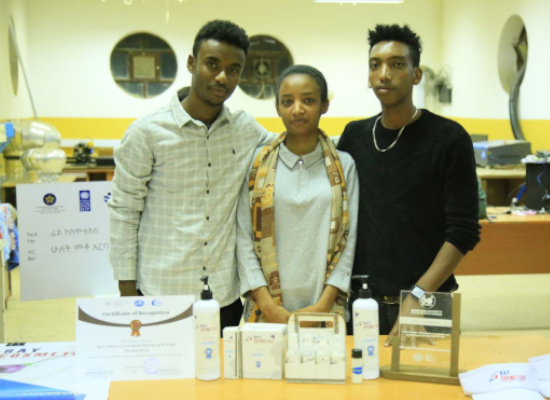The following is a translation of CHEManager. To read the German original version click here.
In the beautiful place, there are - completely incongruously - unpleasant smells. The reason for this is pollution from fish waste, which is thrown into the lake there in large quantities. In an effort to solve practical problems in the community and reduce unemployment at the same time, they participated in the National Agribusiness Ideas Competition 2021 and founded the start-up Ray Cosmetics.
The founders initially received support from their university's Makerspace in implementing the idea until it was ready for the market at the Business Incubation Techno-Entrepreneurship Center (Bitec). Today, the start-up extracts collagen from fish skin waste, thus obtaining valuable basic products for cosmetics from agricultural waste and at the same time preventing it from polluting local water resources. Ray Cosmetics focuses on natural-based cosmetic products that are affordable and support local communities. For this contribution to Sustainable Chemistry, the start-up was awarded the Best Social Impact Award at the ISC3 Innovation Challenge 2022 and was ISC3 Start-up of the Month in October 2022. The International Sustainable Chemistry Collaborative Centre (ISC3) has been supporting the young company since 2022 as part of the ISC3 Global Start-up Service.
Extraction of collagen from fish skin
The start-up's name contains the Amharic word "Raey", which means "to see", and stands for the fact that beauty can be found in the most impossible places if you only look properly. Ray Cosmetics has really looked and as a result uses fish skin and fish scale waste from Lake Tana and other local fish processing plants as raw material for the production of natural-based skin and hair care products. According to the Ethiopian Fish Corporation, the annual fish waste such as skins, scales and bones discarded around Lake Tana amounts to about 16.7 tonnes per year. Ray Cosmetics extracts 1 L of its product for the cosmetics industry from eight to ten average-sized fish skins, including scales. The scales and skins extracted from the fish waste are first washed several times with distilled water and soaked. In the extraction process, they are then treated with a series of chemical and technical processes.
This method is used to extract the acid-soluble collagen, which is then further treated in the next step with a special process to ultimately replace the water content in the start-up's products. The collagen obtained is a protein additive used in skin and hair care products. The substance has moisturising, anti-ageing and detoxifying properties, in addition to the pearl essence found in fish skin and scales. The young company uses 88% natural ingredients, including the collagen extract from fish waste. In the future, the start-up wants to use only natural ingredients and replace conventional additives such as preservatives, thickeners and fragrances with natural alternatives.
"70% of human skin contains collagen. The protein plays a significant role in their structure and function," explains Rewla Ephrem: "Fish skin also contains this protein with its wound-healing properties for the skin." Compared to other products on the local market in Ethiopia, which are mostly imported and involve long marketing and supply chains, the company offers an affordable solution with a focus on quality, straightforward delivery, environmentally friendly production and sustainable supply chain processes.
The start-up team includes three mechanical engineering graduates, two people with additional training in business administration and an expert in graphic design and 3D modelling. The required dermatology expertise was contributed by an experienced dermatologist on the advisory board. Driven by their innovative idea, the founders learned the necessary skills in chemical engineering and dermatology combined with food waste management to bring their solution to market. Ray Cosmetics now employs a total of 14 people and works closely with various organisations such as the Fish Corporation, the Job Creation Commission and local youth and women's empowerment to ensure sustainable entrepreneurship. By producing value-added products, the company helps to reduce environmental pollution from fish waste and makes an important contribution to the circular economy.
Thanks to the support of the ISC3, the start-up was able to take advantage of good networking opportunities and expand its business relationships. "By interacting with other start-ups in different parts of the world, we were able to raise global awareness of our contribution to Sustainable Chemistry, not only to other start-ups, but also to potential investors and suppliers," says Rewla Ephrem. "As the winner of the Best Social Impact Award at the ISC3 Innovation Challenge 2022, we received tailored support from the ISC3 Global Start-up Service, which also provided us with the professional, technical, financial, branding and marketing support we needed to grow our business."
Today, the start-up aims to become a leading, but most importantly, trusted manufacturer of personal care products and cosmetics in Ethiopia and neighbouring countries. To achieve this, the young company is pursuing plans to increase its production in the long term and ensure healthy, sustainable personal care products whose origin cares for the environment at the same time. As a start-up, they have already won the National-Bruh-Business-Idea-Competition of the Ministry of Labor and Skills. They also came second in the African Business Concept Challenge (ABCC) organised by the Global Business School Network.


